Ringling Bros. and Barnum & Bailey Circus
Ringling Bros. and Barnum & Bailey Circus, also known as the Ringling Bros. Circus, Barnum & Bailey Circus, Ringling Bros., Barnum & Bailey or simply Ringling was an American traveling circus company billed as The Greatest Show on Earth. It and its predecessor shows ran from 1871 to 2017. Known as Ringling Bros. and Barnum & Bailey Combined Shows, the circus started in 1919 when the Barnum & Bailey's Greatest Show on Earth, a circus created by P. T. Barnum and James Anthony Bailey, was merged with the Ringling Bros. World's Greatest Shows. The Ringling brothers had purchased Barnum & Bailey Ltd. following Bailey's death in 1906, but ran the circuses separately until they were merged in 1919.
| Ringling Bros. and Barnum & Bailey Circus | |
|---|---|
 Ringling Bros. and Barnum & Bailey Circus's logo as of 2017 | |
| Origin | |
| Country | United States |
| Founder(s) | The Ringling brothers P.T. Barnum James Anthony Bailey |
| Year founded | Founded in 1919 by merger of Ringling Bros World's Greatest Shows and Barnum and Bailey's Greatest Show on Earth |
| Defunct | May 21, 2017 |
| Information | |
| Operator(s) | Feld Entertainment |
| Fate | Closed |
| Traveling show? | Yes |
| Winter quarters | Ellenton, Florida, U.S. |
| Website | www |
After 1957, the circus no longer exhibited under its own portable "big top" tents, instead using permanent venues such as sports stadiums and arenas. In 1967, Irvin Feld and his brother Israel, along with Houston Judge Roy Hofheinz, bought the circus from the Ringling family. In 1971, the Felds and Hofheinz sold the circus to Mattel, buying it back from the toy company in 1981. Since the death of Irvin Feld in 1984, the circus had been a part of Feld Entertainment, an international entertainment firm headed by his son Kenneth Feld, with its headquarters in Ellenton, Florida.
With weakening attendance, many animal rights protests, and high operating costs, the circus performed its final show on May 21, 2017, at Nassau Veterans Memorial Coliseum and closed after 146 years.[1]
History
Predecessor circuses
Hachaliah Bailey appears to have established one of the earliest circuses in the United States after he purchased an African Elephant, whom he named "Old Bet", around 1806,[2][3] just 13 years after John Bill Ricketts first brought circus to America from Great Britain.[4][5][6] Barnum, who as a boy had worked as a ticket seller for Hachaliah Bailey's show, had run the Barnum's American Museum from New York City since 1841 from the former Scudder's American Museum building.[2][3] Besides building up the existing exhibits, Barnum brought in animals to add zoo-like elements, and a freak show.[7] During this time, Barnum took the Museum on road tours, named "P.T. Barnum's Grand Traveling American Museum".[7] The Museum burned down in July 1865.[8] Though Barnum attempted to re-establish the Museum at another location in the city, it too burned down in 1868, and Barnum opted to retire from the museum business.
In 1871, Dan Castello and William Cameron Coup persuaded Barnum to come out of retirement as to lend his name, know-how and financial backing to the circus they had already created in Delavan, Wisconsin. The combined show was named "P.T. Barnum's Great Traveling Museum, Menagerie, Caravan, and Hippodrome".[7] As described by Barnum, Castello and Coup "had a show that was truly immense, and combined all the elements of museum, menagerie, variety performance, concert hall, and circus", and considered it to potentially be "the Greatest Show on Earth", which subsequently became part of the circus's name.[9]
Independently of Castello and Coup, James Anthony Bailey had teamed up with James E. Cooper to create the Cooper and Bailey Circus in the 1860s. The Cooper and Bailey Circus became the chief competitor to Barnum's circus. As Bailey's circus was outperforming his, Barnum sought to merge the circuses.[10] The two groups agreed to combine their shows on March 28, 1881.[11] Initially named "P.T. Barnum's Greatest Show On Earth, And The Great London Circus, Sanger's Royal British Menagerie and The Grand International Allied Shows United", it was eventually shortened to "Barnum and Bailey's Circus".[9] Bailey was instrumental in acquiring Jumbo, advertised as the world's largest elephant, for the show.[10] After Jumbo died, Barnum donated his taxidermied remains to Tufts University on whose Board of Trustees Barnum served as one of Tufts' first trustees. The Barnum Museum of Natural History opened in 1884 on the Tufts campus and Jumbo was a prominent part of the display. To this day the Tufts athletic mascot is Jumbo and its athletic teams are referred to as the "Jumbos". Barnum died in 1891 and Bailey then purchased the circus from his widow. Bailey continued touring the eastern United States until he took his circus to Europe. That tour started on December 27, 1897, and lasted until 1902.[10]
Separately, in 1884, five of the seven Ringling brothers had started a small circus in Baraboo, Wisconsin.[12][13] This was about the same time that Barnum & Bailey were at the peak of their popularity. Similar to dozens of small circuses that toured the Midwest and the Northeast at the time, the brothers moved their circus from town to town in small animal-drawn caravans. Their circus rapidly grew and they were soon able to move their circus by train, which allowed them to have the largest traveling amusement enterprise of that time. Bailey's European tour gave the Ringling brothers an opportunity to move their show from the Midwest to the eastern seaboard. Faced with the new competition, Bailey took his show west of the Rocky Mountains for the first time in 1905. He died the next year, and the circus was sold to the Ringling Brothers.[7]
Ringling Bros. and Barnum & Bailey Circus
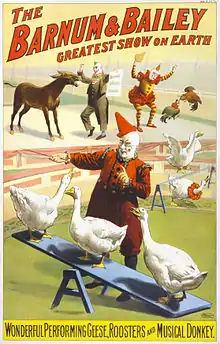
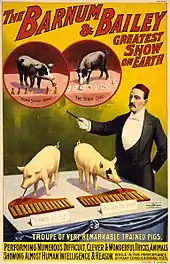

The Ringlings purchased the Barnum & Bailey Greatest Show on Earth in 1907 and ran the circuses separately until 1919. By that time, Charles Edward Ringling and John Nicholas Ringling were the only remaining brothers of the five who founded the circus. They decided that it was too difficult to run the two circuses independently, and on March 29, 1919, "Ringling Bros. and Barnum & Bailey Combined Shows" debuted in New York City. The posters declared, "The Ringling Bros. World's Greatest Shows and the Barnum & Bailey Greatest Show on Earth are now combined into one record-breaking giant of all exhibitions." Charles E. Ringling died in 1926, but the circus flourished through the Roaring Twenties.
John Ringling had the circus move its headquarters to Sarasota, Florida in 1927.[14]
In 1929, the American Circus Corporation signed a contract to perform in New York City. John Ringling purchased American Circus, owner of five circuses, for $1.7 million.[15]
In 1938, the circus made a lucrative offer to Frank Buck, a well-known adventurer and animal collector, to tour as their star attraction and to enter the show astride an elephant. He refused to join the American Federation of Actors, stating that he was "a scientist, not an actor." Though there was a threat of a strike if he did not join the union, he maintained that he would not compromise his principles, saying, "Don't get me wrong. I'm with the working man. I worked like a dog once myself. And my heart is with the fellow who works. But I don't want some ... union delegate telling me when to get on and off an elephant."[16] Eventually, the union gave Buck a special dispensation to introduce Gargantua the gorilla without registering as an actor.
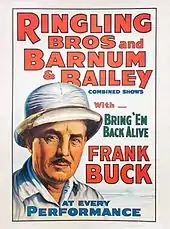
The circus suffered during the 1930s due to the Great Depression, but managed to stay in business. After John Nicholas Ringling's death, his nephew, John Ringling North, managed the indebted circus twice, the first from 1937 to 1943.[17] Special dispensation was given to the circus by President Roosevelt to use the rails to operate in 1942, in spite of travel restrictions imposed as a result of World War II. Many of the most famous images from the circus that were published in magazine and posters were captured by American Photographer Maxwell Frederic Coplan, who traveled the world with the circus, capturing its beauty as well as its harsh realities.
North's cousin Robert took over the president of the show in 1943. North resumed the presidency of the circus in 1947.[17][18]
Hartford circus fire

The Hartford circus fire occurred on July 6, 1944, in Hartford, Connecticut, during an afternoon performance that was attended by approximately 7,500 to 8,700 people. It was one of the worst fire disasters in the history of the United States. Although the Hartford Fire Department responded quickly, the fire was exacerbated by the fact that the canvas circus tent had been waterproofed with a mixture of highly flammable paraffin and gasoline.[19] During the ensuing panic, Emmett Kelly, the tramp clown, threw a bucket of water at the burning canvas tent, and a poignant photograph of his futile attempt was transmitted around the world as news spread of the disaster.[20] At least 167 people were killed in the disaster and hundreds more were injured. One of the dead, Little Miss 1565, was not positively identified until 1991.[21]
Actor and theater director Charles Nelson Reilly, who was thirteen years old at the time, survived the fire and dramatized it in the film on his stage show, "The Life of Reilly". In a 1997 interview, Reilly said that he rarely attended the theater, despite being a director, since the sound of a large audience in a theater reminded him of the large crowd at the circus before the disaster.[22]
In the following investigation, it was discovered that the tent had not been fireproofed. Ringling Bros. had applied to the Army, which had an absolute priority on the material, for enough fireproofing liquid to treat their Big Top, but the Army had refused to release it to them. The circus had instead waterproofed their canvas using an older method of paraffin dissolved in gasoline and painted onto the canvas. The waterproofing worked, but as had been repeatedly shown, it was horribly flammable.[23] Circus management was found to be negligent and several Ringling executives served sentences in jail. Ringling Brothers' management set aside all profits for the next ten years to pay the claims filed against the show by the City of Hartford and the survivors of the fire.[24]
Feld family
The post-war prosperity enjoyed by the rest of the nation was not shared by the circus as crowds dwindled and costs increased. Public tastes, influenced by the movies and television, abandoned the circus, which gave its last performance under the big top in Pittsburgh, Pennsylvania on July 16, 1956. An article in Life magazine reported that "a magical era had passed forever".[18] In 1956, when John Ringling North and Arthur Concello moved the circus from a tent show to an indoor operation, Irvin Feld was one of several promoters hired[25] to work the advance for select dates. Irvin Feld and his brother, Israel Feld, had already made a name for themselves marketing and promoting D.C. area rock and roll shows.[26] In 1959, Ringling Bros. started wintering in Venice, Florida.[13]
In late 1967, Irvin Feld, Israel Feld, and Judge Roy Mark Hofheinz of Texas, together with backing from Richard C. Blum, the founder of Blum Capital, bought the company outright from North and the Ringling family interests for $8 million at a ceremony at Rome's Colosseum.[25][26][27][28] Irving Feld immediately began making other changes to improve the quality and profitability of the show. Irvin got rid of the freak show so as not to capitalize on others' deformations and to become more family orientated. He got rid of the more routine acts.[29]
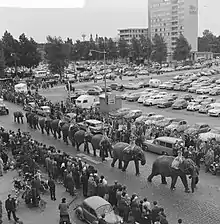
In 1968, with the craft of clowning seemingly neglected and with many of the clowns in their 50s, he established the Ringling Bros. and Barnum & Bailey Clown College.[13][29] Circus Williams, a circus in Europe was purchased for $2 million just to have its star animal trainer, Gunther Gebel-Williams, for the core of his revamped circus. Soon, he split the show into two touring units, Red and Blue, which could tour the country independently.[29] The separate tours could also offer differing slates of acts and themes, enabling circus goers to view both tours where possible.. Also in 1968, Feld hired The King Charles Troupe, a unicycle club from The Bronx and the first ever African-American circus troupe, to perform unicycle basketball for 18 years with the circus.
The company was taken public in 1969.[25] In 1970, Feld's only son Kenneth joined the company and became a co-producer.[30] The circus was sold to the Mattel company in 1971 for $40 million, but the Feld family was retained as management.[29]
After Walt Disney World opened near Orlando, Florida, in 1971, the circus attempted to cash in on the resulting tourism surge by opening Circus World theme park in nearby Haines City, which broke ground on April 26, 1973.[29][31] The theme park was expected to become the circus's winter home as well as to have the Clown College located there.[31][32] Mattel placed the circus corporation up for sale by December 1973 despite its profit contributions, as Mattel as a whole showed a $29.9 million loss in 1972. The park's opening was then delayed until February 1974.[31] Venture Out in America, Inc., a Gulf Oil recreational subsidiary, agreed to buy the combined shows in January 1974, and the opening was further pushed back to 1975.[32] While the Circus Showcase for Circus World opened on February 21, 1974,[33] Venture Out placed the purchase deal back into negotiations, and the opening of the whole complex was moved to an early 1976.[34]
By May 1980, the company expanded to three circuses by adding the one-ring International Circus Festival of Monte Carlo that debuted in Japan and Australia.[29] The Felds bought the circus back in 1982[25] less Circus World. Irvin Feld died in 1984[35] and the company has since been run by Kenneth.
In 1990, the Seminole Gulf Railway (who took over the rail line serving the Venice facility in 1987) could no longer support the show's train cars, which led the combined circus to move its winter base to the Florida State Fairgrounds in Tampa. In 1993, the clown college was moved from the Venice Arena to Baraboo, Wisconsin.[13] In 1995, the company founded the Center for Elephant Conservation (CEC).[36]
Clair George has testified in court that he worked as a consultant in the early 1990s for Kenneth Feld and the Ringling Brothers and Barnum & Bailey Circus. He was involved in the surveillance of Jan Pottker (a journalist who was writing about the Feld family) and of various animal rights groups such as PETA.[37]
After three years in Baraboo, the clown college operated at the Sarasota Opera House in Sarasota until 1998 before the program was suspended.[13] On February 26, 1999, the circus company started previewing Barnum's Kaleidoscape, a one ring, intimate, upscale circus performed under the tent;[38] designed to compete with similar upscale circuses such as Cirque du Soleil, Barnum's Kaleidoscape was not successful, and ceased performances after the end of 2000.
Nicole Feld became the first female producer of Ringling Circus in 2004. In 2009, Nicole and Alana Feld co-produced the circus.[26] In 2001, a group led by The Humane Society of the United States sued the circus over alleged mistreatment of elephants. The suit and a countersuit ended in 2014 with the circus winning a total of $25.2 million in settlements.[39] On March 3, 2015, the circus announced that all elephants would be retired in 2018 to the CEC,[36] but Ringling reversed the decision and retired the elephants in May 2016.[40]
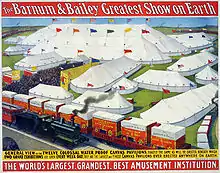


Eight months after it retired the elephants, it was announced on January 14, 2017, that the circus would do 30 more performances, lay off more than 462 employees between March and May 2017 and then close.[41] The circus cited steeply declining ticket sales associated with the loss of the elephants combined with high operating costs as reasons for the closure, along with animal cruelty concerns.[41] On May 7, 2017, its "Circus Extreme" tour was shown for the last time at the Dunkin' Donuts Center in Providence, Rhode Island. The circus's last performance was its "Out of This World" tour at Nassau Veterans Memorial Coliseum on May 21, 2017.[39][42]
Circus trains
The circus maintained two circus train-based shows, one each on its Red Unit and Blue Unit trains.[39] Each train was a mile long with roughly 60 cars: 36 passenger cars, 4 stock cars and 20 freight.[44] Rolling stock belonging to the circus displayed the reporting mark "RBBX". The Blue and Red Tours presented a full three-ring production for two years each (taking off the month of December), visiting alternating major cities each year. Each train presented a different "edition" of the show, using a numbering scheme that dates back to circus origins in 1871—the first year of P.T. Barnum's show. The Blue Tour presented the even-numbered editions on a two-year tour (beginning each even-numbered year), and the Red Tour presented the odd-numbered editions on the same two-year tour (beginning each odd-numbered year).
In the 1950s there was one gigantic train system comprising three separate train loads that brought the main show to the big cities. The first train load consisted of 22 cars and had the tents and the workers to set them up; the second section comprised 28 cars and carried the canvasmen, ushers and sideshow workers; the third section had 19 sleeping cars for the performers.[45]
On January 13, 1994 the circus train, en route from St. Petersburg to a three-day stand in Orlando, derailed about four miles south of Lakeland near U.S. Highway 92. Several of the 150 to 200 train passengers were injured, and two were killed. Circus animals were shaken up but not injured. The heavier horses and elephants, which could derail the train if carried in the middle, were in the front cars. Lions, tigers, bears and other animals were at the back of the train.
From 2003 to 2015 the circus also operated a truck-based Gold Tour presenting a scaled-back, single-ring version of the show designed to serve smaller markets deemed incapable of supporting the three-ring versions.[46]
After May 21, 2017, the train and its cars were either auctioned off or sold to scrappers. In March 2018, Kirby Family Farms, a 501(c)(3) educational facility, located in Williston, Florida bought some of the cars to preserve history, which visitors can see and tour.
As of December 2020, the North Carolina Department of Transportation is attempting to sell nineteen of the Ringling rail cars it purchased with an eye towards rebuilding them for commuter rail service. A federal grant to purchase new commuter rail cars rendered the Ringling rolling stock, mostly dormitory cars, redundant. [47]
Animal care and criticism
Many animal rights groups had criticized the circus for their treatment of animals over the years, saying that using them to perform is cruel and unnecessary.[39]
Ringling Bros. and Barnum & Bailey was investigated following the death of a lion who died from heat and lack of water while the circus train was traveling through the Mojave Desert.[48] In 1998, the United States Department of Agriculture filed charges against Ringling Bros. for forcing a sick elephant to perform.[49] Ringling paid a $20,000 fine.[50]
In 2000, the American Society for the Prevention of Cruelty to Animals (ASPCA) and other animal groups sued the circus, alleging that it violated the Endangered Species Act by its treatment of Asian elephants in its circus.[51] These allegations were based primarily on the testimony of a circus barn worker. After years of litigation and a six-week non-jury trial, the Court dismissed the suit in a written decision in 2009, finding that the barn worker did not have standing to file suit. (ASPCA v. Feld Entm’t, Inc., 677 F. Supp. 2d 55 (D.D.C. 2009)).[52] Meanwhile, the circus learned during the trial that the animal rights groups had paid the barn worker $190,000 to be a plaintiff in the lawsuit. The circus then sued the animal rights groups under the Racketeer Influenced and Corrupt Organizations Act in 2007, accusing the groups of conspiracy to harm its business and other illegal acts.[51][52][53] In December 2012, the ASPCA agreed to pay the circus $9.2 million to settle its part of the lawsuit.[52] The 14-year course of litigation came to an end in May 2014 when The Humane Society of the United States and a number of other animal rights groups paid a $16 million settlement to the circus' parent company, Feld Entertainment.[54]
From 2007 to 2011, the United States Department of Agriculture conducted inspections of the circus's animals, facilities, and records, finding non-compliance with the agency's regulations. The allegations, as brought forth by PETA (People for the Ethical Treatment of Animals) included videotapes of the head elephant trainer and the animal superintendent backstage repeatedly hitting elephants with bullhooks just before the animals would enter the arena for performances. A tiger trainer was videotaped beating tigers during dress rehearsals. An inspection report alleged that a female Asian elephant, Banko, was forced to perform at a show in Los Angeles despite a diagnosis of sand colic and observations that she appeared to be suffering abdominal discomfort. The inspection reports also cited splintered floors and rusted cages. Following these inspections and complaints filed with the USDA by PETA, the company agreed to pay a $270,000 fine, the largest civil penalty ever assessed against an animal exhibitor under the Animal Welfare Act.[55][56]
In March 2015, Feld Entertainment announced it would stop using elephants in its shows by 2018, stating that the 13 elephants that were part of its shows would be sent to the circus's Center for Elephant Conservation, which at that time housed over 40 elephants.[57][58][59] Feld stated that this action was not a result of the allegations by animal rights groups, but rather due to the patchwork of local laws regarding whether elephants could be used in entertainment shows.[60] Some of those local laws referred to were bans against the use of bullhooks.[61] Subsequently, the retirement was moved up to 2016, and the final performances with elephants occurred on May 1, 2016, with "Red Unit" herd performing at the Mohegan Sun Arena at Casey Plaza in Wilkes-Barre, Pennsylvania,[62] and the "Blue Unit" herd performing later in the day at the Dunkin' Donuts Center in Providence, Rhode Island.[63]
Seven tigers, six lions and one leopard were part of a convoy to temporarily move the animals out of Florida ahead of Hurricane Irma on September 5, 2017. One of them, a 6-year-old Siberian tiger named Suzy who had previously starred in the Ringling Bros. and Barnum & Bailey Circus, escaped from a convoy of trucks transporting her from Florida to Memphis International Airport and was fatally shot by police after attacking a nearby dog.[64]
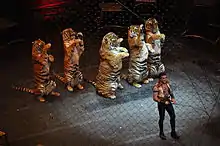

Film
In 1952, Paramount Pictures released the Cecil B. DeMille production The Greatest Show on Earth, which traced the traveling show through the setup and breakdown of several performances. The film starred Charlton Heston, Betty Hutton, James Stewart, and Emmett Kelly. The film was awarded two Academy Awards, including one for Best Picture. A television series of the same title, was inspired by the film, with Jack Palance in the role of Charlton Heston's character. The program ran on Tuesday evenings for thirty episodes on ABC during the 1963–1964 season.
On August 17, 2011, 20th Century Fox announced that a biographical musical drama film entitled The Greatest Showman was in development.[65] Michael Gracey was set to direct, with Jenny Bicks and Bill Condon as writers.[66] Hugh Jackman plays P.T. Barnum, and produced the film,[65] with Michelle Williams portraying Barnum's wife, Charity.[67] Principal photography began in November 2016, and the film was released on December 20, 2017.[68]
See also
| Wikimedia Commons has media related to Ringling Bros. and Barnum & Bailey Circus. |
- Barnum's Kaleidoscape
- William Washington Cole, a Barnum and Bailey business partner
- Ringling Bros. and Barnum & Bailey Clown College
- Barnum and Bailey's Favorite
- John Robinson Circus
Notes
- Graham, Bryan Armen (9 October 2016). "'Sanctuary of joy': performers and crowds bid farewell to Ringling Bros circus". The Guardian. Retrieved 2017-05-22.
- "Setting The Record Straight On Old Bet". American Heritage Magazine. 25 (3). April 1974. Archived from the original on 2008-03-15. Retrieved 2008-03-21.
It is not an established fact that Old Bet was the first elephant to arrive in America, and quite possibly she was second. An April, 1796, publication, Greenleaf’s New York, mentions an elephant journeying to our shores aboard the ship America. A few days later an elephant was exhibited around Beaver Street and Broadway, according to an advertisement in The Argus, April 23, 1796. This area was the location of the Bull's Head Tavern, a place frequented by ships’ captains, drovers, and a variety of businessmen. Hachaliah Bailey of Somers, New York, regularly stayed at the Bull’s Head when he took his cattle to the abattoir, which was located nearby. The newspaper reports that the first elephant was sold to a 'Mister Owen.' Unfortunately, they gave no other information about the man, nor did they tell what he did with the elephant he bought, but Hachaliah Bailey’s business partner and brother-in-law was named Owen. .... P. T. Barnum, not often cited for his honesty, nevertheless made an accurate statement when he called Hach Bailey the father of the American circus. As a boy Barnum had worked as a ticket seller for the Somers drover turned showman.
Old Bet was the first circus elephant in America whose existence is documented by name. - Ariano, Terry (July 15, 2004). "Beasts and Ballyhoo, The Menagerie Men of Somers". Town of Somers History. Somers, New York: Somers Historical Society. Archived from the original on July 25, 2011. Retrieved June 12, 2016.
- Jando, Dominique. "John Bill Ricketts". Circopedia. Retrieved 10 February 2020.
- Baston, Kim (2013). "Transatlantic Journeys: John Bill Ricketts and the Edinburgh Equestrian Circus". Popular Entertainmnet Studies. 4 (2). Retrieved 10 February 2020.
- "Ricketts Circus Historical Marker". Explore PA History. Retrieved 10 February 2020.
- "A History of Ringling Bros. Circus, Soon to Close Forever". The Associated Press. May 17, 2017. Retrieved May 23, 2017.
- "Disastrous Fire" (PDF). The New York Times. 1865-07-14. Retrieved 2008-04-03.
- Albrecht, Ernest (2014). From Barnum & Bailey to Feld: The Creative Evolution of the Greatest Show on Earth. McFarland. p. 5. ISBN 978-0786495245.
- "James A. Bailey, King Of Circus Men, is Dead. News Kept From Performers Till The Show Was Over. Widow Gets Circus Stock. Showman Died Of Erysipelas At His Country Home Near Mount Vernon After A Week's Illness" (PDF). New York Times. April 12, 1906. Retrieved 2007-07-21.
- Famous Elephant. Thai Elephant Conservation Center, Lampang Province. Retrieved 2010-08-28. Archived September 12, 2011, at the Wayback Machine
- "Augustus Ringling Dead. Head of Tented Shows In America Dies in New Orleans" (PDF). New York Times. August 19, 1907. Retrieved 2008-07-20.
When the Ringling Brothers bought the Barnum Biley show they ... got a monopoly on the circus business in America. They now own outright three ...
- Handelman, Jay (January 31, 2012). "Ringling Bros. returning to Southwest Florida". Herald-Tribune. Retrieved August 4, 2015.
- Pollick, Michael (January 30, 2012). "Feld Entertainment moving headquarters to Ellenton". Herald-Tribune. p. 2. Retrieved August 4, 2015.
- "Man Who Started as a Clown Now Controls the Entire Big Top Industry". The New York Times. September 10, 1929. Retrieved 2009-02-12.
John Ringling, head of the Ringling Brothers-Barnum Bailey Combined Circus, has purchased the five circuses, with Winter quarters, of the American Circus Corporation, it was learned yesterday.
- Lehrer, Steven (2006). Bring 'Em Back Alive: The Best of Frank Buck. Texas Tech University press. pp. x–xi. ISBN 978-0-89672-582-9.
- "Died". Time. June 17, 1985. Retrieved 2008-07-20.
John Ringling North, 81, flamboyant, fast-talking showman who from 1937 to 1943 and from 1947 to 1967 ran "The Greatest Show on Earth," the Ringling Bros. and Barnum & Bailey Circus, started by his five uncles in 1884; of a stroke; in Brussels. North took over the debt-spangled show after the death of his last uncle, John Ringling, and modernized it with such attractions as Gargantua the Great, the "vehemently vicious" 550-lb. gorilla that drew more than 40 million circusgoers. In 1956, North folded the big top and reincarnated the show for new arenas of the air-conditioned era.
- "Bailey and the Ringlings". Feld Entertainment. Archived from the original on June 11, 2008. Retrieved 2008-07-21.
In 1929, reacting to the fact that his competitor, the American Circus Corporation, had signed a contract to perform in New York's Madison Square Garden, Ringling purchased American Circus for $1.7 million. In one fell swoop, Ringling had absorbed five major shows: Sells-Floto, Al G. Barnes, Sparks, Hagenbeck-Wallace, and John Robinson. ... On July 16, 1956, in Pittsburgh, Pennsylvania, the financially troubled Ringling Bros. and Barnum & Bailey gave its last performance under the big top. John Ringling North commented that "the tented circus as it exists today is, in my opinion, a thing of the past." Life magazine wrote that "a magical era had passed forever." ... John Ringling North, an executor of his uncle's estate, became president of the show in 1937, a position he held until 1943 when his cousin, Robert, became president. John took the position once again in 1947.
- Rimetz, Brendan (January 2005). "The Great Hartford Circus Fire" (PDF). ChemMatters. Retrieved January 15, 2017.
- "Emmett Kelly Carrying a Bucket of Water at the Hartford Circus Fire".
- "The Hartford Circus Fire ~ July 6, 1944".
- "Charles Nelson Reilly – Recalling the Hartford Circus Fire".
- Handley, Rich. The Circus Fire (Connecticut Public Television), 2000
- Fox, Charles Philip. A Ticket To The Circus (New York: Bramhall House), 1959
- "Feld Family Buys Ringling Bros". New York Times. Associated Press. March 19, 1982. Retrieved 2008-07-20.
Mattel Inc. said that it had sold Ringling Brothers-Barnum & Bailey Combined Shows Inc. for $22.8 million to a family that had owned the circus and has been in its management for 26 years. Two members of the family, Irvin Feld and his son, Kenneth, said that the deal included the circus, Ice Follies, Holiday on Ice and the new Walt Disney's World on Ice. ...Irvin Feld was a record and music promoter and music store chain owner before becoming involved with the circus in 1956. In 1967, he and a brother acquired the company's total assets from the Ringling and North families for $8 million. Two years later, the circus became a publicly held corporation, and in 1971 the company was sold to Mattel for $50 million in stock.
- Tupponce, Joan (July 29, 2009). "Think your office is a circus?". Virginia Business. Retrieved August 8, 2015.
- Calta, Louis (December 5, 1967). "Feuer and Martin Suing Felds Over Circus Sale. 2 Producers Seek to Cancel $10-Million Deal for the Ringling Brothers Show. Felds Have No Comment. Format to Remain. Prediction of a Record Year Circus Started in 1871". New York Times. Retrieved 2008-07-20.
Cy Feuer and Ernest Martin, Broadway producers, brought suit in New York State Supreme Court yesterday to cancel the sale of the Ringling Brothers and Barnum Bailey Circus to Irvin and Israel Feld and Roy M. Hofheinz.
- "Richard Blum: The man behind URS, next to Sen. Feinstein". San Francisco Chronicle. May 11, 2003. Archived from the original on 2003-05-18. Retrieved 6 February 2014.
- Langdon, Dolly (May 12, 1980). "Lord of the Rings' Irvin Feld Has Made a Fading Circus the Greatest Show on Earth Again". People. Retrieved August 4, 2015.
- Heath, Thomas (June 15, 2012). "Feld Entertainment head prepares to pass his empire to his daughters". Washington Post. Archived from the original on June 30, 2013. Retrieved 11 May 2013.
- Brown, Lonnie; Fiero, Peter (December 19, 1973). "Mattel Selling Circus World". Lakeland Ledger. 67 (64). New York Times Company. pp. 1A, 7A. Retrieved August 4, 2015.
- Fiero, Peter (January 23, 1974). "Gulf Oil Subsidiary To Buy Circus World". Lakeland Ledger. 67 (99). New York Times Company. Retrieved August 4, 2015.
- Fiero, Peter (February 21, 1974). "Hurry, Hurry!". Lakeland Ledger. 67 (126). New York Times Company. Retrieved August 4, 2015.
- Fiero, Peter (February 21, 1974). "Cicus World Sale Still On". Lakeland Ledger. 67 (126). New York Times Company. Retrieved August 4, 2015.
- "American Impresario Irvin Feld Dies; Was Owner of Ringling Bros. Circus". Washington Post. September 7, 1984. Retrieved 2008-07-20.
Irvin Feld, 66, the son of East European immigrants who grew up to be a major American impresario and an heir in spirit to the legendary P.T. Barnum as the owner and operator of the Ringling Bros. and Barnum & Bailey Circus, died yesterday in a Venice, Fla., hospital.
- Jones, Charisse (March 5, 2015). "Ringling Bros. eliminating elephant acts". USA Today. Gannett. Retrieved August 14, 2015.
- "The Greatest Vendetta on Earth". Salon.com. August 30, 2001. Archived from the original on May 14, 2008. Retrieved 2008-07-22.
Over lunch, Smith recounted a campaign of surveillance and dirty tricks Feld had unleashed on her in the wake of her 1990 magazine piece in the now-defunct Regardie's magazine. Feld, he said, had hired people to manipulate her whole life over the past eight years. Feld had spent a lot of money on it, he said. He may have even tried to destroy her marriage. In fact, Pottker would eventually learn of a massive dirty tricks operation, involving former CIA officials and operatives, that would target Ringling enemies such as People for the Ethical Treatment of Animals and other groups, not just Pottker.
- Collins, Glenn (February 9, 1999). "Ringling Goes Upscale Under the Little Top; After 42 Years, a Tent Again, but Just One Ring". New York Times. Retrieved August 14, 2015.
- Lush, Tamara (January 14, 2017). "APNewsBreak: Ringling Bros. circus to close after 146 years". The Big Story. AP. Retrieved January 17, 2017.
- "Ringling Bros. to Retire All Circus Elephants in May — 2 Years Early". Retrieved 30 January 2016.
- (1) Wang, Amy B (2017-01-15). "Animal activists finally have something to applaud at Ringling Bros. circus: Its closure". The Washington Post. Retrieved 2017-06-12.
In 2015, Ringling Bros. announced it would stop using elephants in its shows. The lumbering mammals delivered their final performances last May — dancing, spinning and standing on pedestals at the command of the ringmaster — and then were retired to a reserve in central Florida. The move exacerbated the show’s demise; the elephants’ departure ultimately expedited what was a “difficult business decision.”
“Ringling Bros. ticket sales have been declining, but following the transition of the elephants off the road, we saw an even more dramatic drop,” Kenneth Feld said in a statement Saturday. “This, coupled with high operating costs, made the circus an unsustainable business for the company.”
(2) "Ringling Bros. to lay off 462 employees – Orlando Business Journal". www.bizjournals.com. Retrieved 2017-01-24. - (1) Brulliard, Karin (2017-05-21). "Thunderous applause, tears as the 'greatest show on Earth' takes a final bow". The Washington Post. Retrieved 2017-06-12.
... Ringling had become the target of animal protection groups that claimed it mistreated its elephants, and the two sides soon locked in a 14-year legal battle so cutthroat it involved secret informants paid by animal groups and a former CIA official who was paid by Ringling’s parent company, Feld Entertainment, to spy on activists and a journalist. The litigation ended with several animal groups paying a $16 million settlement to Feld.
While the animal activists never prevailed against Ringling in court, they were victorious outside. The allegations of elephant abuse prompted municipalities around the country to ban elephant bullhooks — a sharp metal tool used by handlers — or to prohibit wild animal performances altogether, as Los Angeles recently moved to do. After Ringling retired its last pachyderms to a company-owned elephant conservation center in Florida, ticket sales declined much more than Feld expected, and the company announced in January that Ringling would close for good.
(2) Morales, Mark (2017-01-14). "Ringling Bros. circus to close at Coliseum". Newsday. Archived from the original on 2017-01-28. Retrieved 2017-06-12.
(3) "Ringling Bros. and Barnum & Bailey Final Performance" (video). Ringling Bros. and Barnum & Baily Circus. YouTube. 2017-05-21. Retrieved 2017-06-12. - DeVito, Lee (December 27, 2017). "Kid Rock is being sued by a circus". Detroit Metro Times. Retrieved March 2, 2018.
- "The town without a zipcode". Archived from the original on 2003-09-05. Retrieved 6 February 2014.
- Here Comes The Circus. Popular Mechanics. May 1952. pp. 81–87/220. Retrieved 6 February 2014.
- "Ringling Bros. circus won't visit Tallahassee next year". Retrieved 30 January 2016.
- https://www.charlotteobserver.com/news/business/national-business/article248113200.html. Retrieved December 29, 2020.
- Washington Post — Marc Kaufman (August 8, 2004). "USDA Investigates Death of Circus Lion Activists Dispute Account Given by Ringling Brothers". The Washington Post. Retrieved 2009-07-07.
- "Death of Elephant Questioned". CBS News. Associated Press. April 22, 1998. Retrieved 2009-07-07.
- "Circus elephants in the legal spotlight". May 20, 2009. Archived from the original on May 27, 2009. Retrieved 2009-07-07.
- Jonathan Turley (July 17, 2012). "The Greatest RICO Claim On Earth? Ringling Brothers Allowed To Pursue Animal Rights Organizations in Racketeering Action". Retrieved 2014-02-06.
- "Animal Welfare Inst. v. Feld Entm't, Inc., 944 F. Supp. 2d 1 | Casetext Search + Citator". casetext.com. Retrieved 2020-11-21.
- Sullivan, Emmet G., United States District Judge (July 9, 2012). "Memorandum Opinion: Civ. Action No. 01-1532 (EGS); Feld Entertainment, Inc., Plaintiff, v. American Society for the Prevention of Cruelty to Animals, et al., Defendants, United States District Court for the District of Columbia" (PDF). Retrieved June 13, 2017 – via Jonathan Turley's webpage.
- Heath, Thomas (2014-05-16). "Ringling Circus prevails in 14-year legal case; collects $16M from Humane Society, others". The Washington Post. Retrieved 2017-06-12.
- "Ringling circus agrees to $270K USDA fine involving alleged violations of animal welfare rules". Yahoo News. Associated Press. November 28, 2011. Archived from the original on February 3, 2017. Retrieved 2011-11-28.
- "USDA and Feld Entertainment, Inc., Reach Settlement Agreement". November 28, 2011. Archived from the original on January 18, 2017. Retrieved 2014-02-06.
- Love, Live Travel (2016-02-25). "Events Locale: Ringling Bros. and Barnum & Bailey Circus No More Elephants". Events Locale. Retrieved 2016-02-25.
- Jones, Charisse (5 March 2015). "Ringling Bros. eliminating elephant acts". USA Today. Retrieved 2015-03-05.
- Jones, Charisse (6 March 2015). "Circus' pachyderms to pack it in". State-by-state. USA Today. p. 4A.
- "Ringling Brothers Eliminating Elephant Acts". Associated Press. Archived from the original on 2015-03-06.
- Karin Brulliard, "Some of America’s top zoos still use bullhooks on elephants. That’s about to change," The Washington Post 21 August 2019.
- Lauer-Williams, Kathy. "Final elephant performances: Ringling Bros. shows in Wilkes-Barre".
- Smith, Michelle R. (2016-05-02). "Last dance: Final performance for Ringling Bros. elephants". Associated Press. Retrieved 2016-05-02.
- Brulliard, Karin. "The strange and deadly saga of 15 Ringling Bros. circus cats' final week in America". chicagotribune.com. Retrieved 2017-10-09.
- Weinstein, Joshua L. (17 August 2011). "Michael Gracey to Direct Hugh Jackman in Fox's 'Greatest Showman on Earth'". TheWrap. Retrieved 9 November 2013.
- "Bill Condon to Rewrite Fox's P.T. Barnum Musical Starring Hugh Jackman (Exclusive)". www.hollywoodreporter.com. 2013-10-24. Retrieved September 28, 2015.
- McNary, Dave (6 September 2016). "Michelle Williams in Talks for Hugh Jackman's 'Greatest Showman on Earth'". Variety. Retrieved 28 September 2016.
- "The Greatest Showman (2017) - Release Info - IMDb". On Location Vacations. Retrieved November 17, 2016.
External links
- Official website
- Circus World Museum
- Karl King Page Barnum and Bailey Circus Bandmaster — Wrote much music for the circus, including Barnum and Bailey's Favorite.
- Research Guide to The Hartford Circus Fire, July 6, 1944
- The 1955 Tour of Ringling Bros. and Barnum & Bailey Circus
- Tribute to Ringling Bros.and Barnum & Bailey Circus by brothers Charles Elias Disney & Daniel H. Disney